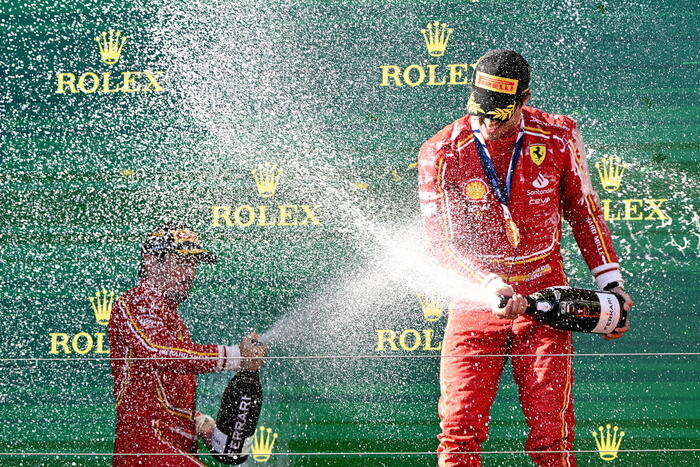Carl Lewis lands in Madrid a day late, which has allowed him to discover "the worst airport in the world" in Frankfurt and reach two conclusions: "Flights are delayed from time to time.
And you never have to fly through Frankfurt.”
He seems like the usual Carl Lewis (Birmingham, Alabama, 61 years old): the athlete whom those who did not buy him (managers, executives, federation members) described as intransigent, arrogant and conceited, and denied him (even though he was the Son of the Wind), and to the rest of the athletes, the right to have personality, rebellion, authority, ambition, discourse, taste for fashion or simply cut their hair à la Grace Jones with parietal gradient
avant la mode
.
His entire career has had to drag that fame to what is considered by many to be the best athlete of the 20th century, a level in the sports mythology of his country, the United States, only surpassed, perhaps, by Michael Jordan or Muhammad Ali.
And still at 61 years old, and more than 25 as a former athlete, with 9 Olympic golds and one silver won between 1984 and 1996 in a showcase and 10 gold medals in world championships, he goes around distributing doctrine.
But no, today Carl Lewis in Madrid is not an arrogant being, he is more of a man with white hair cut to the millimeter who is annoyed by imperfection and a bit curmudgeon.
He failed as a singer, as an actor and as a politician.
He was never as popular as his success claimed, and he accepts it as a consequence of his ongoing struggle to move athletics toward professionalism,
so that athletes could make a good living from their work.
And he continues to train young people at the Santa Monica Club in Houston.
What would you have been, what would have become of your life, if you had not become the Son of the Wind?
That is impossible to answer.
I work with young people and when I tell them about my life I explain that my only aspiration was to be a professional athlete and jump 8.90 meters.
It was the reason why I became what I was.
When I started in athletics, nobody earned enough to live off it and I decided to change it, fight for professionalism.
That's why I wanted to become famous, so that people would listen to me.
To get that influence, the next step was to become the biggest star in the sport, and I did that with four gold medals.
I didn't know where it would go, but I always ask young people: “What do you want to be?
What goal do you want to achieve?
That has been my life, exploiting my talent.
And I don't know what I would have been without it.
Do you visit Madrid very often?
I don't know how many times I have visited Madrid, five or six since the eighties and nineties, I think.
I have traveled so much that it is difficult to remember.
I've been here with Nike, a company I still get paid from.
Since 1997, after I retired, I have continued to move quite a bit on business.
On this occasion, he has traveled to support, together with the Spanish Paralympic champion Teresa Perales, the work of the Sanitas Foundation in favor of inclusive sport...
It could be said that I have sucked the fight for inclusive sport since I was little.
I got into track and field because my mom founded a track and field club for girls, since none existed in the area where we lived.
So my whole career was based on inclusion, on equality.
And of course, coming from the southern United States, in Birmingham, Alabama, the civil rights movement was always very present.
All of these issues have been important and have been a part of my entire life.
You are an athlete, black, a reference figure... Do you feel committed to continue fighting?
There has always been a racist undertone in America.
When Barack Obama became president of the country in 2009, the vision of a family of color that could be accepted by the world triggered fear.
Racism returned.
It was called Tea Party.
In the same way that Obama gave people of color a voice and delivered the message that we have a chance to get things done, Trump gave racism a voice to say, “It's okay to be racist, it's okay to be hateful.”
The fight for civil rights will never end as long as there are those who fear what will happen if they lose power.
The former American athlete takes a long stride in the Madrid studio where the photographs for this interview were taken. Gonzalo Machado
In 2011, you tried to run for the Senate in New Jersey for the Democratic Party.
However, the candidacy was annulled because it was considered that he did not meet the requirement of residence in that State.
Was it the end of his political career?
Yes. I ran to New Jersey after living there for a short time because I saw a clear hole in the system.
There wasn't a voice quite like mine.
And that's why I applied.
However, Houston, where I grew up, became an athlete, and spent my entire sports career, is the complete opposite.
That's why I came back.
I'm too liberal for southern New Jersey, I assure you.
The values there did not agree with mine.
In his days as an athlete, Carl Lewis, the
Son of the Wind
, was 1.88 meters tall and weighed 90 kilos.
He will have lost a couple of centimeters over time and will weigh a few kilos more, but Carl Lewis, black shirt, plaid pants, big white sneakers, as showy as his socks with big colored polka dots, silver hair, little frost on the skull, with a chain around its robust neck and a gold earring in its left ear, continues to be a slender, imposing presence, all grace in movement.
In the divided society of the post-Trump United States, the former athlete continues to be a clear and respected voice, a source of nostalgia for a time, the last decade of the last century, in which athletics was the king of sports and he, King Carl, was the monarch. .
Nine times Olympic champion, two times
100 meter world
record holder.
The best long jumper in history.
The athlete that everyone would like to have been.
The citizen.
It is not mentally complicated at all to reduce the kilos, the years, make his hair grow and see the champion again who left everyone speechless because of his style and harmony;
due to the Hellenic aesthetics of his career, a relief of the Parthenon in motion, crossing right angles, square elbows and knees, and hips floating in the air, well elevated.
More than for the magnificence of your records and marks, you are remembered for your style, you were always said to be athletic perfection...
I was looking for perfection.
I was trained by a coach, Tom Tellez, who understood that you had to try to be perfect.
And between the two of us we look for the perfect stride, the perfect jump, the perfect position.
And he didn't scare me.
Many times we limit ourselves because we fear that we will never reach our goals.
I never wanted to have to say to myself, "I wish I had tried."
It doesn't matter that he didn't make it.
I was looking not for perfection, but for the absolute.
He wanted to jump far, run fast, be rich.
And he wanted it at 17 years old.
And I found a person, Tellez, who told me: “I'm not afraid to help you try.
You have to do it".
I knew that I had to be the
very best
athlete that could exist and achieving perfection was my goal in each of the races.
Is there perfection?
There is only one perfect way to run, only one.
And the closer you get to it, the easier it seems.
It's hard to describe.
It's a rhythm.
It's all about setting a rhythm and sticking to it.
It is a contradiction: the
sprint
is pure acceleration and also absolute relaxation.
When he ran best [his 9.86 seconds in the 100m was a world record for several years] was when he was most relaxed.
That was when it was easier.
The first thing an athlete has to learn is that the better he does, the easier it will seem to him.
The best runs are the easiest because suddenly everything works perfectly, every single aspect of the body.
And what did you feel running perfectly in the finals of Rome 87 and Seoul 88, and contemplating how on the next street a ball of muscles, a doped athlete named Ben Johnson, overtook him and broke the record twice for the world in front of your nose?
Ufff… All the athletes, all the federations, the whole world, we all knew that Ben Johnson was doping.
Doped athletes are bad for business.
Even if their punishment comes later, they will have harmed the sport.
Ben was that, because they were drugs.
He didn't hurt me personally, but because it affected the business, the brands were moving away from our sport.
We had worked hard to make track and field a professional sport, and Ben Johnson comes along…
Carl Lewis is 1.88 meters tall.
He traveled to Madrid to participate in the Night of Inclusive Sports of the Sanitas Foundation. Gonzalo Machado
Before you were a sprinter, you were a long jumper in high school.
And in length he won four gold medals in four consecutive Games, from ages 23 to 31, which no one has ever done…But he never broke the world record.
His rival, Mike Powell, did it, defeating him with a jump of 8.95 meters at the 1991 World Cup in Tokyo.
I respect Mike Powell because we were competing against each other for 10 years until he beat me.
Ten years!
And he had the physical and mental ability to go out there and jump enough to break the record.
Others of us tried, but no one else succeeded.
He has always been like that the length, a person challenging all others.
No one doubted that fate had chosen you to reach nine meters...
I always thought I could beat him at any time, that the 30 feet [9.14 meters] would come without thinking about it, just like that, whoosh, but really there was another matter.
If he had only been a sprinter, he would have run the 100m in 9.70 seconds [his best was 9.86 seconds];
if he had only been a jumper, he would have made it to 30 feet, but I was both, and one compromised the other.
The important thing was not breaking the record for length, but the development of athletics as a professional sport.
He had so many things on his mind that he knew he would always have to sacrifice something.
In Tokyo 91 he made the best four jumps of his life, jumps that no other athlete, except Bob Beamon [world record, with 8.90 meters, in Mexico 68], had ever done: 8.83 meters, 8.91 meters (with wind), 8.87 meters, 8.84 meters, and even so, you don't win the World Cup, and your rival jumps 8.95 and takes the world record… Wasn't that frustrating?
Tokyo was the only moment in all those years when I said to myself: “Today is the day of the longitude record”.
And it just happened that for Mike Powell that was also the day.
He knew that with so many
sprint
races he was sacrificing length, and every year he had put the record out of my mind because I had so many things to do.
And I get to Tokyo and I change and I say to myself: "Today I can do it, today I'm going to do it."
It happened to me something like when someone gets married and says: “Great, we are going to travel, we are going to go around the world”.
And then he already has three children.
And you don't go around the world, and it's not because you give it up, it's because you have to raise your children...
The next great figure in the
sprint
, of all athletics, was Usain Bolt, the Jamaican who holds the world records for the 100m (in 9.58 seconds) and 200m (in 19.19 seconds) and has won eight Olympic gold medals.
Have you talked to him?
No never…
Would I have won?
Athletes compete in the present, not against the past or the future.
Someone recently lectured me that things have changed, that young people run faster than when I ran, so they're better… Well, I ran faster than Jesse Owens, didn't I?
But that is not the issue.
Thirty-five years after his record, going below 10 seconds in the 100 meters seems like child's play, and Ben Johnson's dirty marks, his 9.79 seconds, have been widely surpassed, but doping is not talked about as much as of technological revolution, of magical shoes... Are they a danger to the credibility of athletics?
Do they steal your artistic side?
Shoes are the most important thing to happen to athletics in the last 30 years.
Science is science.
Shoes have a big impact.
In the 100 meters, for example, between 44 and 50 steps are taken.
My stride was just over two meters.
If I add an inch, three centimeters, to my stride, it seems like nothing, right?, but then suddenly a mark of 10.01 seconds becomes 9.95 seconds… That's what the new shoes do.
I love them, and I always oppose those who criticize them.
Evolution is like that.
It's the future.
Athletes compete in the present, not against the past.
You can't compete in the future, so you can't worry about the past.
And that's the shoes.
Lewis, whose mother founded a sports club for girls in Birmingham, Alabama, USA, began competing in the long jump at age 15. Gonzalo Machado
However, you did compete against the past in a certain way.
Los Angeles 84, its first Games, the myth of Jesse Owens, the black athlete who won four gold medals in Berlin 36 with Hitler sitting in the presidential box of the stadium... 100 meters, 200 meters, length, relay, the four golds for which you fought and won.
Ha ha ha, yes, maybe that's a nice way to put it, but it wasn't like that, I wasn't competing against the past, against Jesse Owens.
I, in any case, was using material from the past to build my future: it wasn't about Jesse Owens, it was about the four gold medals.
That was.
Racing now.
Already.
As there will always be records to break, there will always be a connection to the past, but I was competing with the other athletes who were there, at that time, on the track.
Winning four golds, the same golds, gave me an incredible connection with Jesse Owens, and that was the final detail that made me a global superstar.
That's why I had to go for all four, it was part of my advertising package.
What do you think Bolt thinks of his career?
Everybody knows it, my world is different, it's another world.
For these kids, the world before the year 2000 does not exist, and it is a pity because, if they were able to extend their vision of time back 30 years, they would see the serious problems that the sport is going through now.
But no, they close off everything around them and make life revolve only around them.
But you don't want to talk about Bolt...
The problem is that whenever I say something about Bolt, people take it personally, as a criticism of the person.
It's like when you talk about Donald Trump.
If I say, "Your policy on him is wrong," he replies, "You are ugly."
It is the
donaldtrumpification
of the world.
You talk about ideas, about policies, and they criticize the person who criticizes them.
The fact is that I and others have given so much to make the sport a better place for everyone, I have sacrificed so many things... If it hadn't been like that, I would have earned more money, for sure.
But, if I say that, there is always a percentage of the world of athletics that responds: "
Oh, my God
, this attitude…, blah, blah, blah”.
Look, athletics improved economically and globally thanks to three figures: Jesse Owens, Tommie Smith and John Carlos [the American athletes who raised their gloved fists representing
black power
on the podium at Mexico 68 ] and myself.
And at some point in our career we were all called
assholes .
[douchebag].
John Carlos and Tommie Smith were stupid, I was stupid… That's how it was.
It's not a coincidence.
Billie Jean King [first great tennis player] was an asshole… All of us who made an impact on the sport were called stupid, but we were leaders willing to sacrifice for others to improve.
So I'm not interested in anyone telling me I'm wonderful.
It's not about that, it's not about me, it's not about my celebrity.
It's about the impact you've had, what you've left behind you.
The question is: is the world better after you have been through it?
Subscribe to continue reading
Read without limits
Keep reading
I'm already a subscriber













